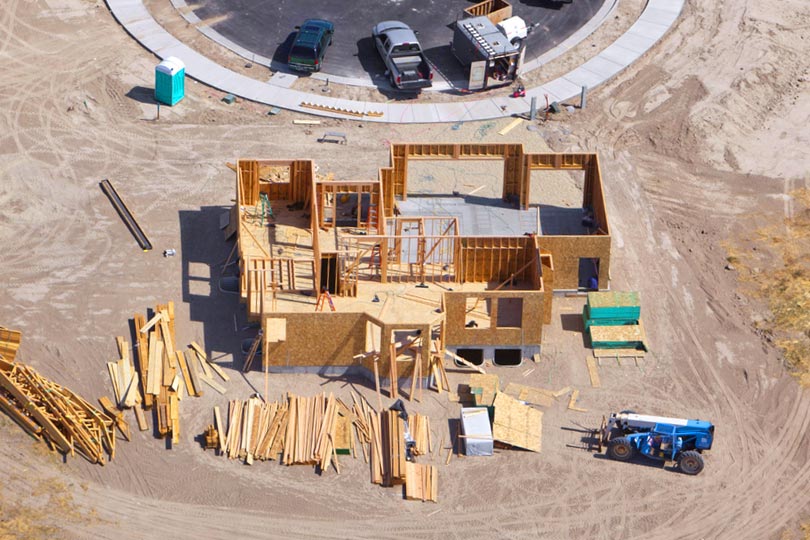Before You Build, Check Your Credit

Sometimes you need every advantage you can get to qualify for a more complex loan like a single close construction mortgage, and paying attention to the credit issues below can help.
Credit Issues When Building Your Home: Timing Of Other Credit Applications
There is a general rule of thumb in mortgage lending; it’s ill-advised to apply for new credit while trying to get a home loan.
Because credit standards are more strict for One-Time Close mortgages, this is an area to pay special attention to. When was your last credit application, and how long will it be between that and your construction loan application? Put as much time as possible between the two.
Credit Issues: Your Open Accounts
Too many open credit accounts that eat your monthly income make it tougher for your lender to justify your mortgage. That does not mean you should cancel all your accounts--closing them will not improve FICO scores and may actually hurt those scores.
Why? The better move is to pay off these accounts or pay them down below 30% of the total limit. Your lender respects the age of your credit accounts, and keeping them with low balances is ideal.
Another issue to watch? Your credit limit. If you are offered a higher credit limit on your card, take it but do not use it. If your credit utilization percentage is higher than 50% for that account, you risk negative effects on your credit. If your limit is increased, it lowers your credit utilization score, which can help you get closer to loan approval.
Owning Or Renting A Vehicle
A car loan with a long term may be a red flag to lenders concerned about your ability to afford your construction loan. A shorter loan term indicates the borrower is able to manage the higher payments.
And for those who rent instead of own, your lender will take the monthly financial burden into account but may also consider that at the end of the lease, you have no asset to show for your money.
This may have the lender viewing your lease in a different way than if you had a car loan. This won’t apply to every lender, but it’s a good thing to keep in mind.
The thing about auto loans to remember is that if you have 10 payments or fewer the lender may decide not to include the loan in your overall debt-to-income ratio because you will own the car outright soon.
A lease, on the other hand, may lead to another lease. That implies an ongoing financial obligation, which is important to the lender.
Want More Information About One-Time Close Loans?
We have done extensive research on the FHA (Federal Housing Administration) and the VA (Department of Veterans Affairs) One-Time Close Construction loan programs.
We have spoken directly to licensed lenders that originate these residential loan types in most states and each company has supplied us with the guidelines for their products.
We can connect you with mortgage loan officers who work for lenders that know the product well and have consistently provided quality service.
If you are interested in being contacted by a licensed lender in your area, please send responses to the questions below. All information is treated confidentially.
OneTimeClose.com provides information and connects consumers to qualified One-Time Close lenders to raise awareness about this loan product and to help consumers receive higher-quality service.
We are not paid for endorsing or recommending the lenders or loan originators and do not otherwise benefit from doing so. Consumers should shop for mortgage services and compare their options before agreeing to proceed.
Please note that investor guidelines for the FHA and VA One-Time Close Construction Program only allow for single-family dwellings (1 unit) – and NOT for multi-family units (no duplexes, triplexes or fourplexes).
In addition, the following homes/building styles are not allowed under these programs: Kit Homes, Barndominiums, Log Cabin Homes, Shipping Container Homes, Stilt Homes, Solar (only) or Wind Powered (only) Homes.
Contact Us: Send Us Your Request – Spam Safe
Please send your email request to [email protected], which authorizes OneTimeClose.com to share your personal information with one mortgage lender licensed in your area to contact you.
1. Send your first and last name, e-mail address, and contact telephone number.
2. Tell us the city and state of the proposed property.
3. Tell us your and/or the Co-borrower’s credit profile: Excellent – (680+), Good - (640-679), Fair – (620-639), or Poor- (Below 620). 620 is the minimum qualifying credit score for this product.
4. Are you or your spouse (Co-borrower) eligible veterans? If either of you is an eligible veteran, down payments as low as $0 may be available up to the maximum amount your debt-to-income ratio per VA will allow – there are no maximum loan amounts as per VA guidelines.
Most VA lenders will go up to $1,500,000 and review higher loan amounts on a case-by-case basis. If not, the FHA down payment is 3.5% up to the maximum FHA lending limit for your county.
Do you know what's on your credit report?
Learn what your score means.

July 26, 2024The Federal Housing Administration (FHA) offers qualifying borrowers the option to build a home from the ground up using a Single Close FHA Construction Loan. This program, also known as a One-Time Close construction mortgage, allows borrowers to finance the construction of a new home and convert it into a permanent mortgage with just one closing, streamlining the often complex process of building a house.
July 19, 2024VA One-Time Close construction loans help qualifying veterans build homes they will own and occupy once the construction phase is complete. One-time close loans, or construction-to-permanent loans, combine construction and permanent financing into a single closing procedure. VA One-Time Close mortgages have no VA-required down payment or mortgage insurance, making them attractive options for qualifying borrowers.
July 12, 2024When planning a construction loan, you have many options. For example, do you want to buy land with a loan to build the house? Or do you already own a parcel suitable for the construction project? There are many other choices to make with home loans, but some don’t necessarily apply to construction mortgages.








